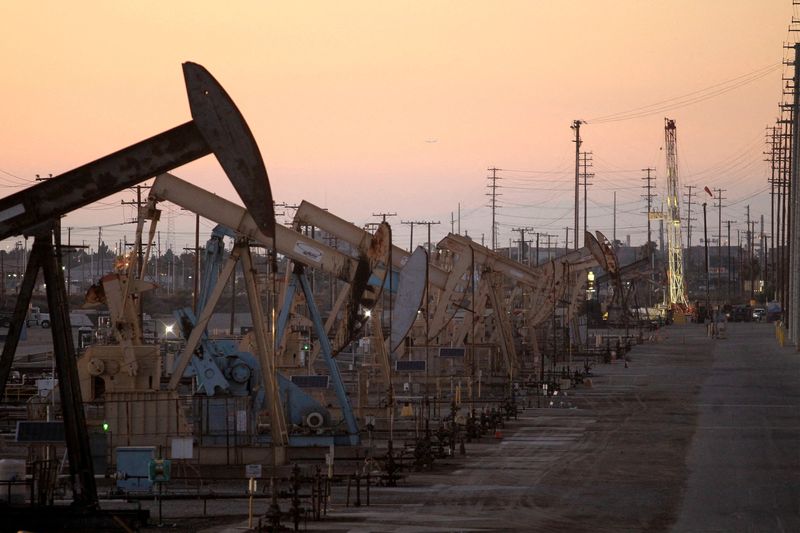IEA raises oil demand outlook again but still lags OPEC By Reuters
Breaking News
‘;
Published Mar 14, 2024 05:03AM ET
Updated Mar 14, 2024 08:55AM ET
© Reuters. FILE PHOTO: Oil rig pumpjacks, also known as thirsty birds, extract crude from the Wilmington Field oil deposits area near Long Beach, California July 30, 2013. REUTERS/David McNew/File Photo
By Noah Browning and Alex Lawler
LONDON (Reuters) -The International Energy Agency on Thursday raised its view on 2024 oil demand growth for a fourth time since November as Houthi attacks disrupt Red Sea shipping, though it remains far less bullish than producer group OPEC.
The Organization of the Petroleum-Exporting Countries (OPEC) and the IEA, which represents industrialised countries, have clashed in recent years over issues such as the long-term oil demand outlook and the need for investment in new supply.
World oil demand will rise by 1.3 million bpd in 2024, the IEA said in its latest report, up 110,000 bpd from last month. It forecast a slight supply deficit this year after OPEC+ members extended cuts, from a surplus previously.
Brent crude oil rose as much as 80 cents a barrel towards $85 after the IEA report was released, touching its highest since November.
“Quite a bullish report, with upward revisions on demand growth, and lower supply growth estimates,” said UBS analyst Giovanni Staunovo.
The IEA had initially forecast 2024 demand growth of 860,000 bpd in June 2023. Demand rose by 2.3 million bpd last year.
“The slowdown in growth, already apparent in recent data, means that oil consumption reverts towards its historical trend after several years of volatility from the post-pandemic rebound,” the IEA said.
OPEC on Tuesday kept its demand growth forecast unchanged at 2.25 million bpd, meaning the views of OPEC and IEA remain nearly 1 million bpd apart, representing almost 1% of daily world demand.
Dovish signals from central banks indicated a path out of economic doldrums, the IEA said, but subdued economic data in China remains a concern.
Disruptions to shipping in the Red Sea region have forced more trade on to the longer route around the Cape of Good Hope, pushing up the number of barrels at sea to nearly 1.9 billion as of the end of February, the IEA said.
Longer routes boosted fuel demand and the loading of ships with fuel, or bunkering, in Singapore reached all-time highs.
ECONOMIC HEADWINDS
The IEA still thinks the cloudy economic outlook will weigh on demand, the agency noted, even as the challenges to shipping provide a short-term boost.
Growth will continue to be heavily skewed towards non-OECD countries, even as China’s dominance gradually fades, the IEA said. It expects China’s demand growth to slow to 620,000 bpd from 1.7 million bpd in 2023.
On the supply side, the IEA said growth from non-OPEC+ countries would continue to significantly eclipse oil demand expansion in 2024, although extended cuts by some OPEC+ members had tightened the balance.
Some OPEC+ members earlier this month extended voluntary cuts made in the first quarter until the end of June. The IEA said it was treating those cuts as being in place for the whole year, unwinding them only once OPEC+ confirms the move.
“On that basis, our balance for the year shifts from a surplus to a slight deficit, but oil tanks may get some relief as the massive volumes of oil on water reach their final destination,” the agency said.
IEA raises oil demand outlook again but still lags OPEC
Most Popular Articles
Terms And Conditions
Privacy Policy
Risk Warning
Do not sell my personal information
© 2007-2024 Fusion Media Limited. All Rights Reserved.
Risk Disclosure: Trading in financial instruments and/or cryptocurrencies involves high risks including the risk of losing some, or all, of your investment amount, and may not be suitable for all investors. Prices of cryptocurrencies are extremely volatile and may be affected by external factors such as financial, regulatory or political events. Trading on margin increases the financial risks.Before deciding to trade in financial instrument or cryptocurrencies you should be fully informed of the risks and costs associated with trading the financial markets, carefully consider your investment objectives, level of experience, and risk appetite, and seek professional advice where needed.Fusion Media would like to remind you that the data contained in this website is not necessarily real-time nor accurate. The data and prices on the website are not necessarily provided by any market or exchange, but may be provided by market makers, and so prices may not be accurate and may differ from the actual price at any given market, meaning prices are indicative and not appropriate for trading purposes. Fusion Media and any provider of the data contained in this website will not accept liability for any loss or damage as a result of your trading, or your reliance on the information contained within this website.It is prohibited to use, store, reproduce, display, modify, transmit or distribute the data contained in this website without the explicit prior written permission of Fusion Media and/or the data provider. All intellectual property rights are reserved by the providers and/or the exchange providing the data contained in this website.Fusion Media may be compensated by the advertisers that appear on the website, based on your interaction with the advertisements or advertisers.
